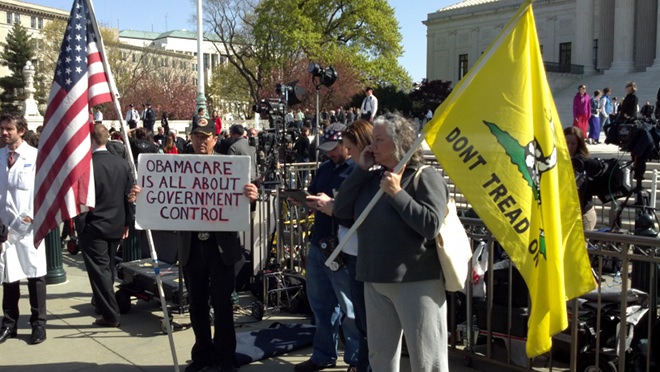The linchpin of President Obama’s health care law will come into focus Tuesday as the Supreme Court hears two hours of oral arguments on whether Congress can require Americans to purchase insurance.
For supporters and foes of the law, and for court watchers who have been awaiting this case for over two years, Tuesday is the main event.
Inside the chamber, stakeholders and other interested parties will be listening with unabated anticipation for the justices — particularly the court’s five conservatives — to subtly reveal their views of the extent of federal power. Do their questions from the bench suggest they’re amenable to tossing decades of post-New Deal jurisprudence out the window? Or do they suggest agreement with a decades-old consensus that Congress has broad leeway to regulate interstate commerce?
Or will they suggest something completely unexpected?
Outside the court, tea party protesters and pro-health care reform demonstrators will face off, bused into Washington to remind the public of the stakes and the controversy at the heart of this law.
Temperatures climbed Monday after the justices hinted that they’re likely to rule on the merits of the challenge this year, rather than punt the case years into the future.
The Obama administration will make two broad arguments Tuesday: That the mandate is an outgrowth of Congress’ power to tax; and that the requirement that people purchase health insurance can also be justified under Congress’ power to regulate interstate commerce.
Decades of precedent suggests that Congress has broad authority to regulate the health care industry.
But opponents of the law argue that regardless of recent precedent, requiring Americans to engage in a market transaction — to purchase an item they would rather not purchase — is a bridge too far, and if deemed legitimate, would create boundless congressional authority to force people to buy just about anything. Some lower court judges bought into that argument and struck down the mandate on the premise that the Obama administration has not adequately articulated what “limiting principles” preclude it from abusing such power.
The health care law’s proponents retort that it isn’t the job of the White House to explain the judicial restrictions on its power — that it’s the job of the 26 Republican-led states that brought the lawsuit to explain why the individual mandate exceeds the limits of congressional authority to regulate what is a matter of interstate commerce. They argue that there’s no such thing as “inactivity” when it comes to health care, because those who are willfully or helplessly uninsured also receive health care and directly impose costs on the system regardless.
The politics surrounding the Affordable Care Act, surveys suggest, favor Republicans. GOP presidential contender Rick Santorum appeared outside the court Monday to make a public showing of his hatred of the law. Senate Majority Leader Harry Reid (D-NV), meanwhile, said he did not watch Monday’s arguments.










